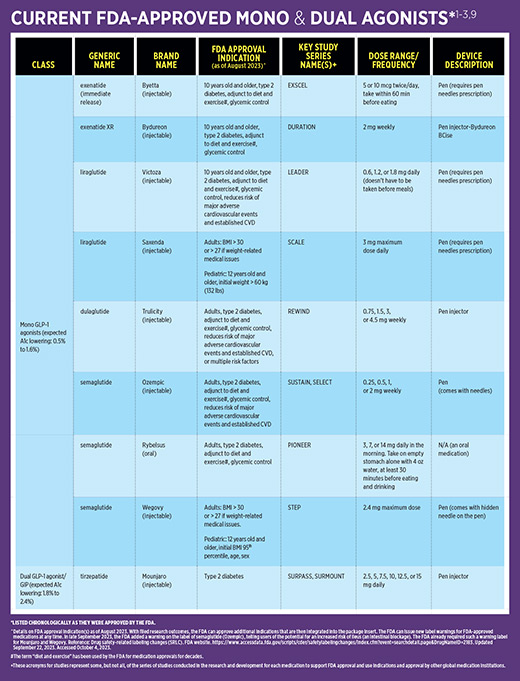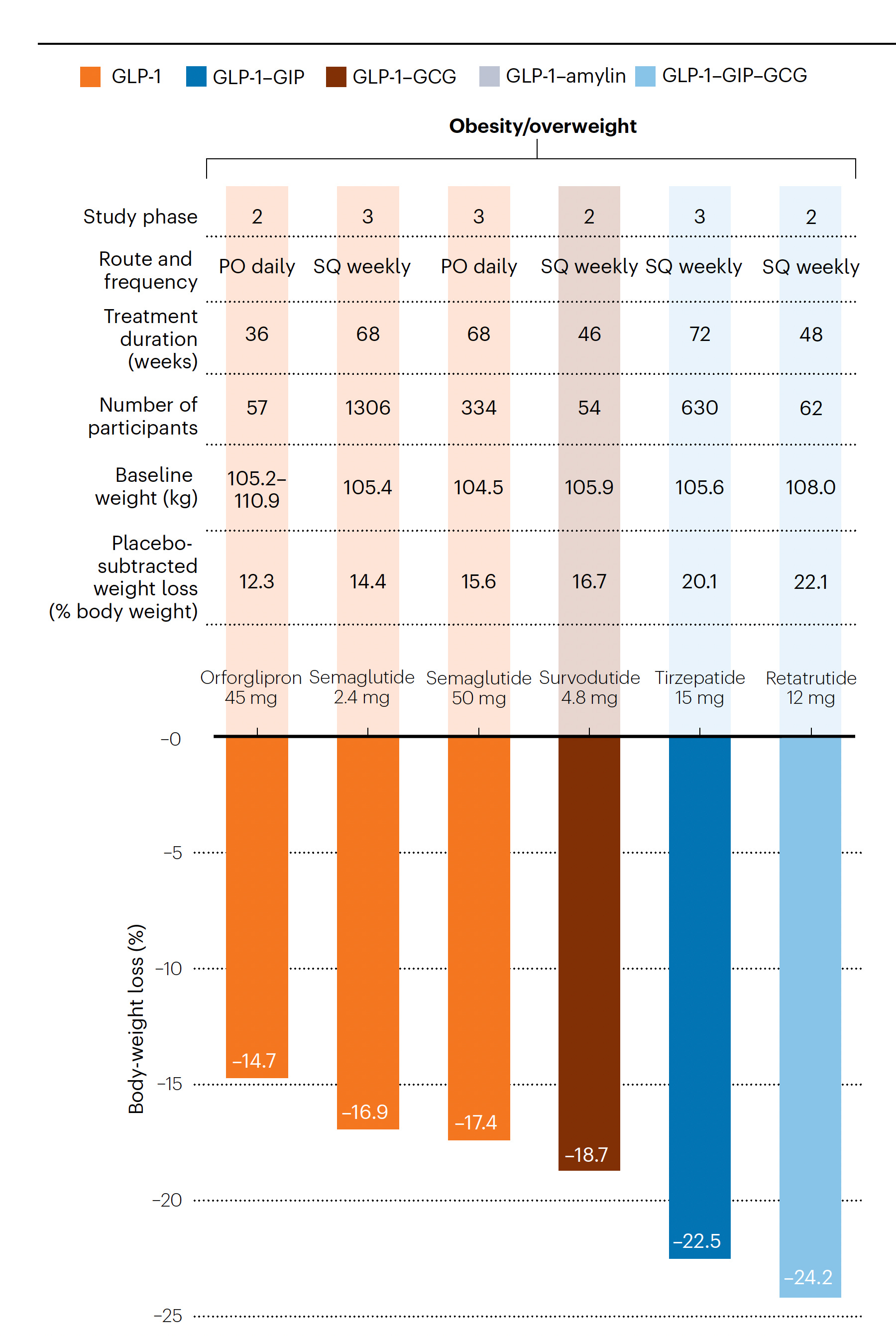GLP-1 weight management involves using GLP-1 receptor agonists to aid in weight loss. These medications help control appetite and blood sugar levels.
GLP-1, or glucagon-like peptide-1, is a crucial hormone in regulating appetite and blood glucose. Medications that mimic GLP-1 can assist in weight management by reducing hunger and increasing feelings of fullness. These drugs are often used in conjunction with a healthy diet and exercise.
They can be particularly beneficial for individuals with obesity or type 2 diabetes. GLP-1 receptor agonists have been shown to aid in weight loss, improving overall health outcomes significantly. Consulting with a healthcare provider is essential before starting any GLP-1-based treatment for weight management.

Credit: www.todaysdietitian.com
Glp-1 And Its Role In Weight Management
GLP-1, or Glucagon-like peptide-1, is a hormone that helps manage weight. It has gained popularity for its effectiveness in weight control. Understanding GLP-1 can help you achieve your weight management goals.
The Science Behind Glp-1
GLP-1 is produced in the intestines. It is released after eating. This hormone plays a crucial role in regulating blood sugar levels. It stimulates insulin secretion and inhibits glucagon release. Both actions help control blood sugar levels.
GLP-1 also slows gastric emptying. This means food stays in the stomach longer. It prolongs the feeling of fullness. Scientists have studied GLP-1 extensively for its potential in weight management.
How Glp-1 Affects Appetite And Digestion
GLP-1 affects the brain’s appetite center. It reduces hunger and food intake. People feel full faster and eat less. This is beneficial for weight management.
The hormone also impacts digestion. It slows the movement of food through the digestive tract. This helps control appetite and prolongs satiety.
Here is a summary of how GLP-1 works:
| Action | Effect |
|---|---|
| Stimulates insulin secretion | Controls blood sugar levels |
| Inhibits glucagon release | Prevents blood sugar spikes |
| Slows gastric emptying | Prolongs feeling of fullness |
| Reduces appetite | Decreases food intake |
By understanding these effects, you can see why GLP-1 is important. It helps control appetite and digestion effectively. This makes it a powerful tool for weight management.
Glp-1 Agonists: A Tool For Weight Loss
GLP-1 agonists are a breakthrough in weight management. These medications mimic the GLP-1 hormone, which helps regulate appetite. They are becoming a popular choice for those seeking effective weight loss solutions.
Common Glp-1 Agonists On The Market
Several GLP-1 agonists are available today. Here are some of the most common ones:
- Liraglutide – Often used for both weight management and diabetes.
- Semaglutide – Known for its effectiveness in weight loss.
- Exenatide – Commonly prescribed for type 2 diabetes and weight loss.
The Mechanism Of Glp-1 Agonists In Weight Management
GLP-1 agonists work by mimicking the GLP-1 hormone. This hormone plays a key role in appetite regulation and blood sugar control.
Here are the main ways GLP-1 agonists help with weight management:
- Appetite Suppression: They reduce hunger, making you eat less.
- Slowed Gastric Emptying: They slow down how quickly food leaves the stomach, keeping you full longer.
- Improved Insulin Sensitivity: They enhance the body’s response to insulin, helping to control blood sugar levels.
These mechanisms collectively contribute to effective weight loss and better health management.
The Benefits Of Glp-1 For Weight Loss
GLP-1 agonists offer significant advantages for weight loss. These medications mimic the GLP-1 hormone, which helps regulate appetite and blood sugar levels. Understanding the benefits of GLP-1 can help you make informed decisions about weight management strategies.
Comparative Efficacy Of Glp-1 Agonists
Studies show that GLP-1 agonists are highly effective for weight loss. They outperform many traditional weight loss methods. Below is a comparison table of GLP-1 agonists with other weight loss treatments:
| Method | Average Weight Loss | Duration |
|---|---|---|
| GLP-1 Agonists | 10-15% | 6-12 months |
| Diet and Exercise | 5-10% | 12 months |
| Other Medications | 5-8% | 6-12 months |
GLP-1 agonists consistently show better results in clinical trials. They help people achieve sustainable weight loss.
Long-term Health Advantages
Using GLP-1 agonists for weight loss has long-term health benefits. These medications improve metabolic health and reduce the risk of chronic diseases. Here are some key benefits:
- Better blood sugar control
- Reduced risk of type 2 diabetes
- Lower cholesterol levels
- Improved heart health
GLP-1 agonists also enhance overall well-being. They promote a healthier lifestyle by making weight management easier.
In summary, the benefits of GLP-1 for weight loss are significant. They offer an effective and sustainable solution for long-term health.

Credit: erictopol.substack.com
Addressing The Challenges And Side Effects
GLP-1 weight management can be very effective. But, it comes with its own challenges and side effects. Understanding these can help users manage them better. This section will explore how to address common side effects and considerations for long-term use.
Managing Common Side Effects
Many people experience nausea when starting GLP-1 medications. Eating smaller meals can help reduce this. Avoiding high-fat and spicy foods can also make a difference.
Some users report diarrhea or constipation. Staying hydrated and eating fiber-rich foods can help. Regular exercise may also alleviate these issues.
Headaches are another common side effect. Over-the-counter pain relievers can offer relief. Ensure you are drinking enough water throughout the day.
Feeling dizzy can also occur. Standing up slowly from sitting or lying positions can minimize this. Eating balanced meals can help keep your energy stable.
Considerations For Long-term Use
Long-term use of GLP-1 medications requires careful monitoring. Regular check-ups with your doctor are essential. They will monitor your blood sugar levels and other vital signs.
Some users may experience weight regain after stopping the medication. Maintaining a healthy lifestyle is crucial. This includes regular exercise and balanced nutrition.
Long-term users should also watch for potential kidney issues. Staying hydrated and having regular kidney function tests are important.
Monitoring for thyroid issues is also essential. Your doctor may recommend periodic thyroid function tests.
Keeping these considerations in mind can help you use GLP-1 medications safely and effectively.
Integrating Glp-1 Into Lifestyle For Optimal Results
Integrating GLP-1 into your lifestyle can lead to significant weight loss. GLP-1, or glucagon-like peptide-1, is a hormone that helps regulate appetite. When combined with healthy habits, its effects are amplified. Below are some tips to enhance GLP-1 results and real-world success stories.
Lifestyle Changes To Enhance Glp-1 Effects
Making simple lifestyle changes can boost the effectiveness of GLP-1 treatments. Here are some key strategies:
- Balanced Diet: Eat more fruits, vegetables, and lean proteins.
- Regular Exercise: Aim for at least 30 minutes of moderate exercise daily.
- Hydration: Drink plenty of water to stay hydrated and feel full.
- Sleep: Ensure you get 7-9 hours of quality sleep each night.
- Mindful Eating: Pay attention to hunger cues and avoid emotional eating.
| Activity | Benefits |
|---|---|
| Balanced Diet | Provides essential nutrients and controls hunger |
| Regular Exercise | Boosts metabolism and burns calories |
| Hydration | Helps you feel full and supports bodily functions |
| Sleep | Regulates hormones and improves recovery |
| Mindful Eating | Prevents overeating and promotes better digestion |
Success Stories: Real-world Weight Loss With Glp-1
Many people have achieved their weight loss goals with GLP-1. Here are some inspiring success stories:
- Sarah: Lost 25 pounds in 3 months by combining GLP-1 with daily walks and a low-carb diet.
- John: Shed 40 pounds in 6 months by integrating GLP-1, swimming, and mindful eating practices.
- Emily: Achieved a 30-pound weight loss in 4 months through GLP-1, balanced meals, and yoga sessions.
These stories show how effective GLP-1 can be when paired with lifestyle changes. Adopting these strategies can lead to similar results for you.

Credit: www.nutrisense.io
Frequently Asked Questions
What Is Glp-1 In Weight Management?
GLP-1 is a hormone that helps regulate appetite and blood sugar levels, aiding in weight management.
How Does Glp-1 Help With Weight Loss?
GLP-1 reduces appetite, increases feelings of fullness, and slows stomach emptying, contributing to weight loss.
Are Glp-1 Medications Safe?
GLP-1 medications are generally safe but may have side effects. Consult a healthcare provider for personalized advice.
What Are the Common Side Effects Of Glp-1?
Common side effects include nausea, vomiting, and diarrhea. These typically decrease over time.
Who Can Use Glp-1 For Weight Management?
Adults with obesity or overweight with weight-related conditions may use GLP-1 under medical supervision.
How Is Glp-1 Administered?
Depending on the medication, GLP-1 is usually administered via injection, either daily or weekly.
Can Glp-1 Replace Diet And Exercise?
No, GLP-1 should complement a healthy diet and exercise, not replace them.
Is Glp-1 Effective For Long-term Weight Loss?
GLP-1 can be effective long-term when combined with lifestyle changes like diet and exercise.
Does Insurance Cover Glp-1 Medications?
Insurance coverage for GLP-1 medications varies. Check with your provider for specific details.
How Quickly Does Glp-1 Work For Weight Loss?
Weight loss can begin within weeks, but significant results usually take a few months.
Conclusion
GLP-1 weight management offers a promising path for those seeking a healthier lifestyle. By regulating appetite and blood sugar, it aids in effective weight loss. Always consult a healthcare professional before starting any new weight management program. Stay informed, stay healthy, and embrace a balanced approach to your wellness journey.




